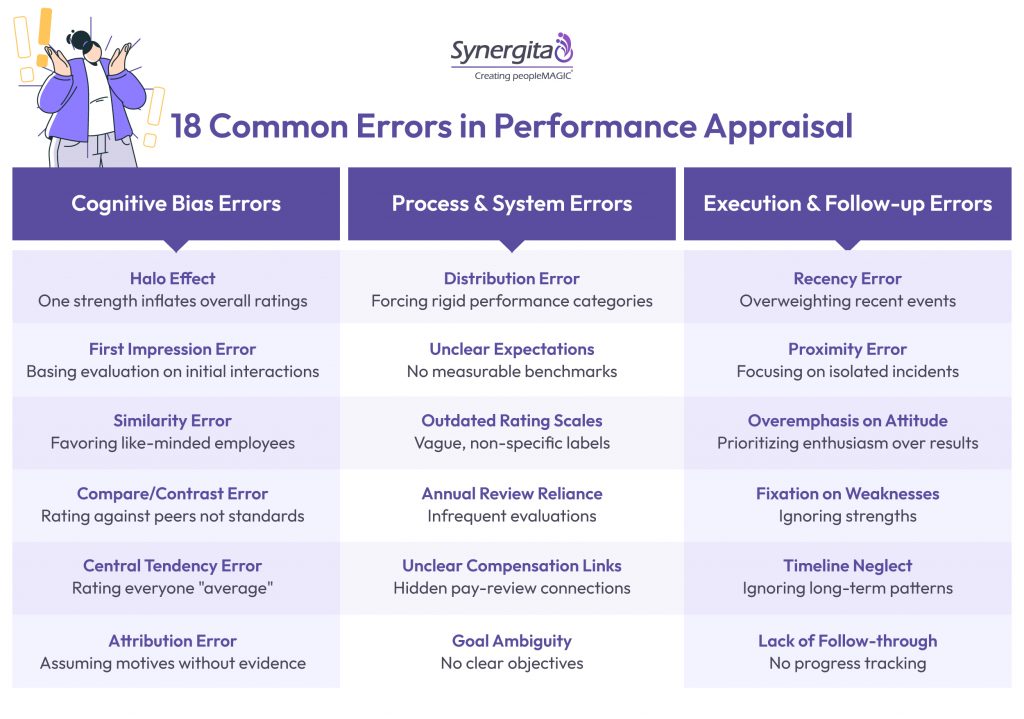Performance appraisals are one of HR’s most complex processes. It has rarely seen the expected results as organizations rely on a complicated and time-consuming process once a year. An effective performance appraisal process requires specific methodology, follow-ups, analysis, etc. When performance appraisals are not done right, they tend to demotivate and demoralize the workforce and defeat the purpose of an assessment.
Fortunately, newer approaches have surfaced, modern performance management solutions solve these errors in performance appraisal systematically.. They cover all areas of employee performance, including reviews. Before choosing to invest in the right performance appraisal system, let’s understand the most common errors in performance appraisal to ensure your workforce feels valued.
The Financial Impact of Appraisal Errors
Research shows companies lose $2.1M per 1,000 employees annually from these performance appraisal mistakes:
- 45 hours/year wasted on flawed reviews
- 30% turnover increase from unfair appraisals
- 14% productivity drop from vague feedback
This makes fixing performance appraisal mistakes a critical revenue-protection strategy.
Top 11 Performance Appraisal Mistakes
The following are some of the common mistakes in performance appraisal:
1. Unclear Expectations: Without clear baselines, evaluating performance is impossible. Employees must be assessed against job descriptions and goals not peers.
2. Too Much Importance Given to Attitude: Enthusiasm shouldn’t overshadow competence. Quiet high-performers exist, address social gaps without penalizing skill.
3. Halo-effect Bias: One strength shouldn’t color the entire evaluation. Skewed positivity ignores gaps in other responsibilities.
4. Focus on Single Deficiency: Conversely, fixating on one weakness while ignoring strengths is unfair. Balance is key.
5. Overlooking the Timeline: Annual reviews invite recency error — overweighting recent mistakes over yearly contributions.
6. Error of Attribution: Assuming motives for behavior kills objectivity. Stick to facts, not interpretations.
7. Using Old Rating Scales: Labels like “meets expectations” are judgmental, not motivational. They encourage manager bias.
8. Continuing with Annual Reviews: This top common performance management error reduces reviews to compensation formalities, killing engagement.
9. Unclear Pay-Performance Links: Employees must understand how reviews impact earnings. Transparency is non-negotiable.
10. No Follow-through: Even perfect goals fail without progress check-ins. Feedback can’t gather dust until next year.
11. Open-ended Appraisal Process: Reviews must end with new measurable goals. Ratings alone achieve nothing.

18 Common Errors in Performance Appraisal

The following 18 critical mistakes represent the most common errors in performance appraisal that sabotage its effectiveness:
1. Halo Effect: Letting one strength inflate overall ratings, ignoring other performance areas.
2. Distribution Error: Forcing employees into rigid categories (high/medium/low) regardless of actual performance.
3. First Impression Error: Anchoring evaluations to initial interactions rather than year-long performance.
4. Central Tendency Error: Rating everyone “average” to avoid tough decisions or difficult conversations.
5. Recency Error: Overemphasizing recent events while ignoring long-term contributions.
6. Proximity Error: Focusing on isolated incidents rather than holistic performance patterns.
7. Similarity Error: Favoring employees who share your background, personality, or work style.
8. Compare/Contrast Error: Rating employees against peers rather than objective performance standards.
9. Unclear Expectations: Assessing performance without defined job descriptions or measurable goals.
10. Overemphasis on Attitude: Prioritizing enthusiasm over actual results and core competencies.
11. Fixation on Weaknesses: Overlooking strengths due to disproportionate focus on deficiencies.
12. Timeline Neglect: Allowing recency error to distort annual evaluations by overweighting recent events.
13. Attribution Error: Assuming motives behind behaviors without factual basis.
14. Outdated Rating Scales: Using vague labels like “meets expectations” that lack measurable criteria.
15. Annual Review Reliance: The most damaging of common performance management errors prioritizing yearly formality over continuous feedback.
16. Unclear Compensation Links: Failing to transparently connect performance ratings to pay outcomes.
17. Lack of Follow-through: Conducting reviews without subsequent check-ins on development plans.
18. Goal Ambiguity: Ending appraisals without setting specific, measurable objectives.
Why These Mistakes and Errors Matter
If your reviews aren’t driving measurable outcomes higher retention, productivity, or engagement, you’re likely perpetuating these common errors in performance appraisal.
For example:
- Annual reviews ignore real-time feedback needs
- Vague scales obscure true performance gaps
- Bias-driven errors erode trust in leadership
Addressing these common performance management errors is strategic, not optional.
The Solution: AI-Driven Performance Management
To sidestep errors in performance appraisal, invest in AI-powered Perform tools that automate bias detection, enable continuous feedback, and align goals company-wide.
Key features to seek:
- Sentiment Analysis: Detects tone in feedback to flag subjectivity
- SMART Goal Integration: Creates measurable, trackable objectives
- Real-time Analytics: Surfaces trends like recency or halo effects
- Pulse Surveys: Replaces annual reviews with ongoing insights
This transforms appraisals from demoralizing chores into engines of growth slashing common performance management errors while boosting engagement.
Synergita eliminates these exact pitfalls, replacing error-prone reviews with continuous, bias-free development cycles.
So why wait? Start your free trial today and Experience the difference.

In conclusion
It is safe to say that if you are not getting measurable results after a performance review process, you’re committing common errors in performance appraisal. In that case, you may need to rethink your approach. It could be that you are using a method that doesn’t fit in with your business model, or you are using a software platform that is not aligned with your goals.
Fortunately, Synergita exists to minimize common errors in performance appraisal ensuring that you have a strong workforce, motivated and loyal, and who can help you achieve your goals. If you are facing these problems, then It might be the right time for us to have a talk.

